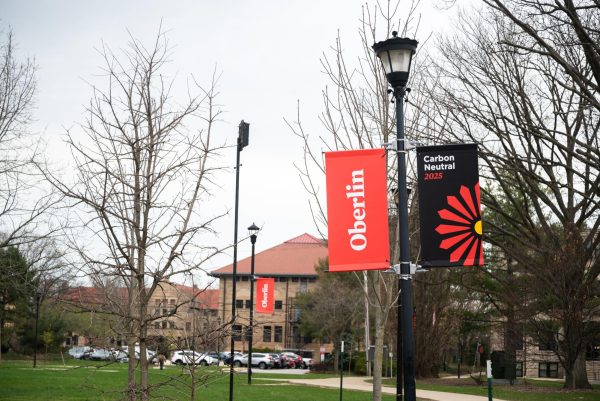College and Conservatory Announce Optional Pass/No Entry Grading System, COVID-19 Incompletes
In an effort to accommodate students affected by the COVID-19 pandemic and the transition to remote learning, the College and Conservatory have announced new grading protocols effective for the rest of the semester. The changes were announced by faculty governance committees and the Arts and Sciences and Conservatory Deans’ Offices via emails sent in mid-April.
The new grading protocols shift the optional Pass/No Pass system to an optional Pass/No Entry grading model, but the default grading system for most courses remains letter grades. If a student elects to take a class Pass/No Entry and earns a grade below a C-, the course will not be listed on their official transcript. This is a change from the previous optional Pass/No Pass system in which students who received below a C- would have received a ‘No Pass’ notation on their transcript.
While all classes in the College can be taken Pass/No Entry, some courses in the Conservatory must retain the letter-grade system, like Principal Private Studies. All Pass/No Pass courses in the College and Conservatory will automatically shift to the Pass/No Entry grading model.
In addition to this change, the College and Conservatory announced a new option to take COVID-19 incompletes which extend due dates for coursework. In their April 13 email to College faculty and students, the Arts and Sciences Dean’s Office and the Educational Plans and Policies Committee also listed recommended pedagogical adjustments, including allowing asynchronous participation and revising timelines for work to accommodate students during a time of transition.
Pass/No Entry
Under the new grading protocols, the deadline to declare Pass/No Entry has been extended to June 5 so students can see their grades before they make their decision. Previously, the deadline to declare Pass/No Pass or to withdraw from a course was scheduled for this Friday, May 8.
Associate Dean of the College of Arts and Sciences and EPPC Chair Laura Baudot commented on the decision to revise grading protocols for the semester.
“In March, EPPC and the Dean’s Office pledged to review the situation on the ground,” Baudot wrote in an email to the Review. “We heard from faculty, staff, and Student Senate, and watched how other peer institutions were responding. Ultimately, we came to a principled yet responsive set of grading options.”
While all College courses are eligible for Pass/No Entry, certain Conservatory courses will retain the letter-grade system. Senior Associate Dean for Academic Affairs in the Conservatory and Chair of the Educational Plans Committee Peter Swendsen, OC ’99, commented on the decision to shift to an optional Pass/No Entry model, which was announced in an April 22 email to Conservatory students.
“Many of the Conservatory’s classes, as well as student-taught secondary lessons and some ensembles, already had the P/NP option in place, and we felt that converting these to P/NE for the semester was very sensible in the extraordinary circumstances in which we all now find ourselves,” Swendsen wrote in an email to the Review. “We also decided to allow this option for some of our core courses in music theory and music history due to the large number of students enrolled in those.”
Swendsen stated that the majority of the Conservatory courses that require a letter-grade system are Principal Private Studies because these individual lessons are essential for completing major and recital requirements. Private lessons are personalized, so there are opportunities for necessary adjustments to be made between a student and teacher, according to Swendsen.
Students cannot earn academic credit toward their graduation requirements for courses in which they receive a No Entry. In regular semesters, students cannot earn credit for a class if they receive a No Pass or withdraw from a course.
COVID-19 Incompletes
College and Conservatory students who cannot complete their finals due to the pandemic may be eligible for the new COVID-19 incomplete option. Unlike an educational incomplete, which students can only use twice during their Oberlin career, a student can take unlimited COVID-19 incompletes this semester.
Students who wish to take a COVID-19 incomplete must apply to do so before this Friday. In order to apply, students must talk to their professor about their plan before filling out an Academic and Advising Resource Center incomplete request, available on the Registrar’s website. All work for COVID-19 incompletes will be due on June 17. In the case of a COVID-19 incomplete, students can declare Pass/No Entry until June 30th.
Emergency incompletes will remain an option as well.
“We chose to keep the category of emergency incompletes because those normally involve some intervention between the student and faculty member; we anticipate that there may be some situations where a student might need some assistance with obtaining an incomplete where the student cannot negotiate for themself,” Liz Clerkin, associate dean for academic advising and the registrar, wrote in an email to the Review. “This is unlike the COVID 19 Incomplete where we are asking the student to negotiate the incomplete with the faculty member before requesting it through our office.”
Recommended Pedagogical Adjustments for the Arts & Sciences
The pedagogical recommendations that the EPPC and the Dean’s Office sent to Arts and Sciences students and faculty included: a reassessment of the pacing and quantity of coursework, permitting students to participate in classes asynchronously; showing leniency in grading; and more. The EPPC also addressed professors who had assigned work over spring recess, just after students had left campus.
“We have heard reports from students that faculty assigned work over spring recess, much to the dismay of many students who had to adjust to complex circumstances during that time,” the statement read. “If this applies to your course, please compensate for this additional work by reducing student work load later in the semester.”
Professor of Mathematics Jeff Witmer, who developed a second-module course on epidemiology in the context of COVID-19, gauged his students’ well-being during spring break in a check-in email that asked students how they were feeling through multiple choice answers. He found that many students were severely stressed, and he adjusted deadlines for his course accordingly.
“I said with all those stresses and disruptions in people’s lives, ‘What’s reasonable regarding my course?’” Witmer said. “I have an obligation to offer a rigorous course that you have to do the work to earn a passing grade, but I don’t have to be hard-nosed about when the project is due. And as long as the final product is something that’s respectable, I can say you get full credit for it. Even if there was some internal deadline, then I just am going to ignore it.”
Witmer had already made course adjustments before the College’s April 13 memo. Similarly, Professor of Psychology and Environmental Studies Cindy Frantz had already adjusted her courses, but she felt that the memo was still beneficial for professors.
“It was helpful to have the institution sanction reducing the quantity of course content,” Frantz wrote in an email to the Review. “No one wants to water down the rigor of our courses, but we also have to be realistic of what’s possible under these circumstances. It was very helpful to have that perspective articulated clearly by the administration.”
Overall, Frantz is impressed with how the administration has handled new grading criteria during the pandemic.
“Administrators have stepped up, staff have stepped up, faculty have stepped up,” Franz wrote. “And so have students. I’ve realized new things about how I teach my courses; this experience will definitely make me a better teacher in the future.”
Collaboration with Student Senate
The COVID-19 incomplete and the new Pass/No Entry system are the result of a collaboration between the EPPC, EPC, and Student Senate. However, Senate maintains that a Universal Pass system with an opt-out option for letter grades would have been the best grading option. Senate’s petition for a Universal Pass grading system — signed by over 1300 current students — was denied by administrators and faculty governance committees last month (“Administrators, Faculty Governance Committees Decline to Endorse Universal Pass,” April 4, 2020).
Student Senate Chair Henry Hicks spoke to Oberlin’s current grading protocols.
“Combined with the collaborative progress we were able to make on extending the Pass/No Entry deadline to a week after final grades are released and in providing an unlimited cap on ‘COVID-19’ incompletes, we believe that the existing system is certainly progress given the situation,” Hicks wrote in an email to the Review. “However, it still remains Student Senate’s belief that only a Universal [Pass] grading system can properly address students’ situations during a global pandemic.”
Over the past six weeks, Senate has worked with faculty and administrators, communicating concerns that students have voiced about their courses through a remote learning survey. Hicks urged students to reach out to Senate if professors have not followed the recommended pedagogical adjustments sent by the EPPC and Arts and Sciences Dean’s Office.
“These recommendations are a way to address many of the concerns expressed by students over the past month and a half,” Hicks wrote. “However, as they are recommendations and not policies, Senate would recommend that if students are still facing these or similar problems, that they reach out directly to us at senate@oberlin.edu, or to the offices of the College and Conservatory deans.”
Hicks told the Review that Senate will refocus their advocacy to the Pass/No Entry system for the remainder of the semester.
“We’ll be providing direct assistance for students who choose to appeal their final grades, and are looking into long-term reforms that could alleviate some of the concerns with the current grading system,” Hicks wrote.
Senate sent an email to the student body on May 4 reminding students of the procedures to appeal failing grades. The email also stated that Senate would look into other avenues to support students, such as advocating for an extra-semester of financial aid for people who may no longer be on track to graduate in eight semesters.






